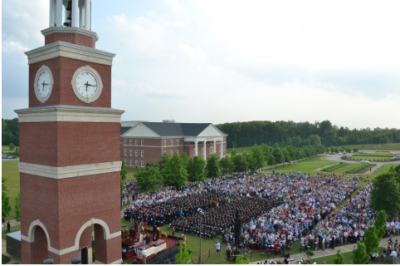JACKSON, Tenn.—Union University has informed the Council for Christian Colleges and Universities (CCCU) that it will withdraw from the coalition in the wake of two member schools changing their hiring policies to include same-sex couples.
CCCU president Shirley Hoogstra and board chairman Charles Pollard, who also serves as president of John Brown University, received a letter from Union president Dub Oliver on Monday, almost four weeks after Eastern Mennonite University (EMU) and Goshen College announced they would begin hiring non-celibate homosexual staff and faculty.
“It grieves us to make this decision as we have been members of the CCCU since 1991,” Oliver wrote in the letter. He said Union benefited from the council’s programs, professional development, and advocacy, but “our faithfulness to the authority of Scripture takes precedence … marriage is at the heart of the Gospel.”
Union, founded in 1823 and located in Jackson, Tenn., is the oldest Southern Baptist–affiliated university in the country and could serve as a bellwether for other schools. The university will now look to the Southern Baptist Convention’s Ethics and Religious Liberty Commission and the Family Research Council to provide its representation in Washington, D.C.
Union did not make its decision in conjunction with any other schools and does not have imminent plans to form a competing organization.
“We’re not trying to pull other schools away from the CCCU,” Oliver told me.
Hoogstra confirmed to me in an email that no other schools have withdrawn from the organization since EMU and Goshen announced their hiring policy changes.
The CCCU board met for regular business two weeks ago and decided not to take any immediate action on the status of EMU and Goshen. Instead, the board released a brief statement saying it would discuss the matter with member presidents. Union had asked the board to call a special member meeting to vote on the issue, but Hoogstra sent a letter to member presidents saying a more deliberative process would allow the council to honor one of its founding members (EMU).
“I was frankly heartbroken,” said Union vice president Bob Agee, a former Oklahoma Baptist University president who served on the CCCU board in the 1990s and 2000s. “The CCCU board has simply chosen not to deal with it, not to take a stand on a moral issue, and it weakens our position.”
Union’s letter expressed concern that the CCCU wasn’t already prepared to deal with this issue, since EMU started reevaluating its hiring policies in October 2013. Some member presidents took up for Hoogstra, noting she has faced staffing, budget, and other challenges since she took over the council last year following her predecessor’s turbulent tenure.
Another area of concern is the council’s tepid approach to public policy, such as the First Amendment Defense Act, a bill that would prevent the federal government from changing the tax status of organizations that hold to biblical marriage views. In June, more than 70 Christian educational leaders sent a letter—which referenced the CCCU—to congressional leaders in support of the bill, but the CCCU did not sign on to it. (Editor’s note: See update at the end of this article.)
Hoogstra defended the CCCU board’s reasoning in taking its time in making a decision on the status of EMU and Goshen.
“The board’s process of calling all member presidents has yielded great insight and wisdom and has revealed that almost all appreciate the opportunity to give input and support the board’s desire to follow a good and respectful process,” she said. “Following a good and respectful process does not mean that we do not recognize the importance of this issue in our current cultural climate. We do, and as such, CCCU is advocating vigorously on behalf of schools that hold the orthodox view of marriage, and we will continue to do so both for our members and for others who hold that view but are no longer members.”
Several CCCU member presidents told me the council is headed toward a decision to move EMU and Goshen from full membership to affiliate status. That may be enough to keep many schools in the CCCU, but some say such action would be insufficient.
“In my understanding, the affiliate status is for schools moving toward membership,” said Thomas White, president of Cedarville University, a conservative Christian institution unaffiliated with a denomination. “What I see in these schools is a movement away from the clear biblical teaching on marriage.”
Sources at numerous Christian institutions told me they expect another association will form, in part because of the ongoing uncertainty surrounding Goshen and EMU membership, and in part because a need already existed. Some Christian institutions don’t meet the CCCU’s liberal arts criteria, and a handful of qualifying schools, such as Liberty University and Patrick Henry College, have chosen not to join the council for their own reasons.
“The CCCU is at a crossroads,” White said. “It has to decide if it wants to affiliate with the schools that stand firm on the biblical view of marriage or the schools that are changing. … Any action that compromises [a biblical marriage] position would leave us with little option than to seek to affiliate with like-minded institutions.”
UPDATE (Aug. 13, 11:30 a.m.): Shapri LoMaglio, the Council for Christian Colleges and Universities’ vice president for government and external relations, said the council supports the First Amendment Defense Act but decided not to sign the June letter referenced in the article above. Her explanation: The council did not want to imply that only Christian colleges and universities would face challenges to their tax-exempt status. LoMaglio insisted in an email to WORLD, “We have been persistent defenders of the religious liberty of our institutions, working to defend the accreditation of our institutions, their tax-exempt status, their hiring rights, and on many other issues.”
Source: J.C. Derrick, http://www.worldmag.com/
 Listen Online
Listen Online Watch Online
Watch Online Find a Station in Your Area
Find a Station in Your Area








 Listen Now
Listen Now Watch Online
Watch Online
